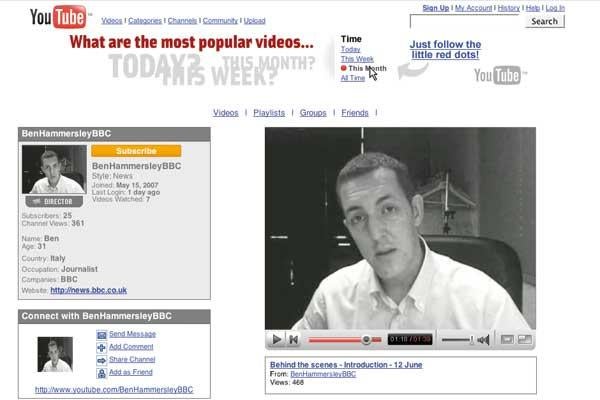
The BBC has dispatched reporter Ben Hammersley to spend two weeks using new social media web tools to cover the run-up to the July general election.
He will visit four cities and report for BBC World, World Service radio, News 24 and BBC News online.
In what is a first for the BBC, Hammersley will file to his personal blog, he will upload photos to Flickr, video to YouTube, post snippets of text to the microblogging site Twitter, bookmark research on the social bookmarking site del.icio.us and network with people through Facebook.
‘This is an experiment to look at how a series of international reports can be spread through social media sites and hopefully reach new audiences,’says Richard Sambrook, director of BBC Global News. ‘We talk a lot about convergence – but we want to explore what that can really mean in international reporting.”
The project is guided by the BBC’s 15 web principles, which were published in February 2007 – the fifth of which states: ‘Treat the entire web as a creative canvas: don’t restrict your creativity to your own site.”
Hammersley says: ‘The interesting thing that we’re doing is that the majority of the content that we’re going to be producing online is going to be hosted externally on different external sites.’ ‘We’re using services which are already very popular.
‘By using external tools we’re able to do very interesting things very quickly without resorting to any enormously long development time. It’s about being part of the web, rather than on the web.”
Hammersley worked on setting up the Guardian blogs including the Comment is Free site before taking on the role of multimedia reporter for the paper. He has previously reported from Afghanistan for The Guardian using text, photos and video, but this is the first time he has worked across such a wide range of media for one story.
‘I’ve wanted to do this for 10 years or so and now the tools are all in place. I don’t really know whether twittering my way around a two-week assignment is a good idea or not. I think it is. I think it could be quite compelling for people who are into that sort of thing. And it certainly wouldn’t take that much time,’he says.
Twitter might not take up much time, but it’s clear that reporting across such a broad spectrum of media substantially increases the workload for the journalist.
‘It is a lot more work,’admits Hammersley. ‘That’s just the way that you have to work nowadays. You have to work across multiple outlets and I don’t think that’s particularly new.”
As simple and popular as social media tools are, there is a learning curve for journalists. Hammersley has a long and distinguished record in the online field and this, says the BBC, is why he was chosen for the experiment.
‘He has a unique set of skills and understanding of the online world and how we can approach it,’says Sambrook. ‘I also believe he can break the mould for foreign correspondents and reach new audiences in new ways. It will be the antithesis of rooftop ‘dish-reporting’. It’s not something every BBC journalist can or should do – we believe in playing to strengths – and we don’t have a formal title for the role.
‘It won’t be perfect first time – but it will be interesting and will be the start of a new way of approaching global issues.”
Hammersley also plans to make a number of behind-the-scenes reports to let the readers into the life of a reporter on the road,
‘We’re going to be exposing an awful lot of the workings. These reports will be in black and white to clearly separate them from the other work and to make it look a bit cool,’says Hammersley. ‘I’ve always been fascinated when a major story happens: how does a BBC crew get there? What do you have to actually do to appear on the TV? How many people are there in the room when you’re going live? How much gear are you carrying with you? What gear are you carrying? When do you go to bed?
‘All of those sorts of questions are really interesting. And it’s not an enormous effort with modern technology to record that sort of thing, edit it very quickly, and bang it on YouTube.”
Hammersley realises that little of this content would ever make it on to broadcast TV, but the web is an ideal place for it. An interview that might last an hour and result in a one-minute slot on TV can sit on the web in its entirety for those who want it.
‘You’re not going to get 155 million people watching it, but the 100,000 or so who do will find it very useful, educational and a great public service,’he says.
The coverage will culminate in two documentaries that will be broadcast by BBC World at the time of the elections, which will include some of the behind-the-scenes coverage. Giles Wilson, the BBC News blogs editor, believes the methods of reporting with social media could be used as an example for other journalists.
‘Social bookmarks, for example, are something that could be very useful for lots of journalists,’says Wilson. ‘It could give us some really useful insight into how we can best use these tools and enhance the reporting as well.”
It is hoped that the use of social media can be replicated across the BBC, although at this stage it is purely an experiment. Wilson says: ‘We don’t know how that would work out, on what scale, or by whom. We’re really open-minded about it. But we think there will be some use.”
Email pged@pressgazette.co.uk to point out mistakes, provide story tips or send in a letter for publication on our "Letters Page" blog

